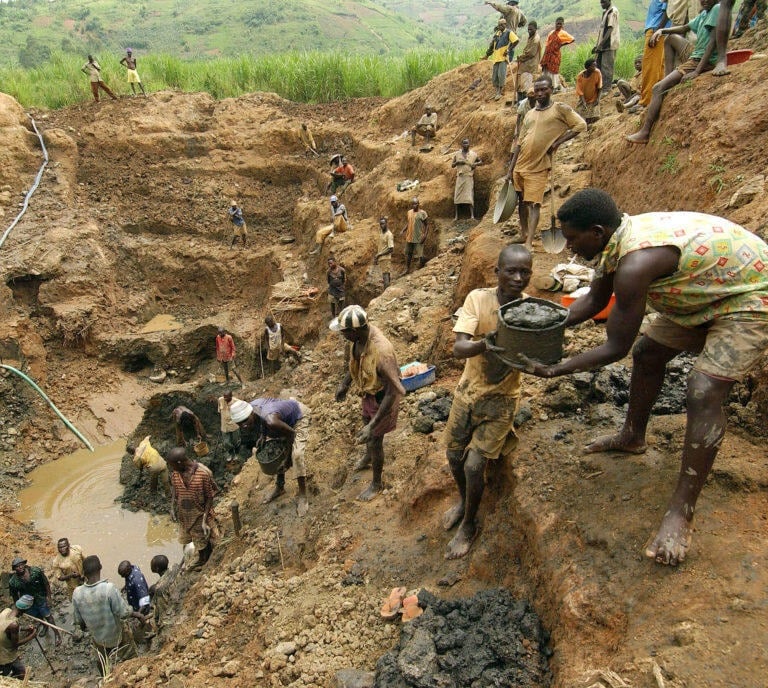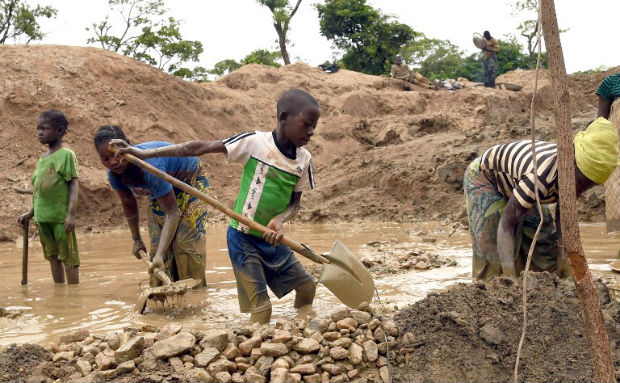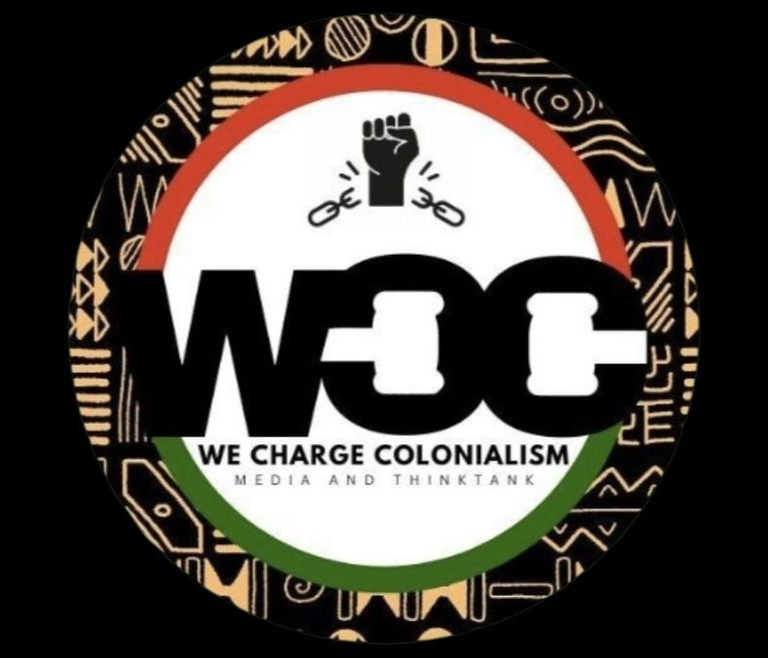New Age Imperialism: Corporate Colonialism in Congo
The new age of colonialism in the Congo is not what we expect from the past.



In 1976, Network, a satirical black comedy-drama, was released and received widespread critical acclaim. A film about an evening newscaster who went off the rails after learning about his firing. Howard Beale, played by Peter Finch, launches into a tirade on live television causing a boost in the network’s rating. The film offers a lot of insight into sensationalism in media and was perhaps an indicator of things to come, with today’s overwhelming use of exciting and shocking stories or language at the expense of accuracy.
In a world dominated by corporations, the Network offered a revelation that seemed to be more of an admonition than entertainment. After Beale directed one of his diatribes against corporations, he was quickly called into the network’s headquarters. Arthur Jensen, played by Ned Beatty, delivered the following message:
You are an old man who thinks in terms of nations and peoples. There are no nations. There are no peoples. There are no Russians. There are no Arabs. There are no third worlds. There is no West. There is only one holistic system of systems, one vast and immane, interwoven, interacting, multivariate, multinational dominion of dollars. Petro-dollars, electro-dollars, multi-dollars, reichmarks, rins, rubles, pounds, and shekels. It is the international system of currency which determines the totality of life on this planet…We no longer live in a world of nations and ideologies, Mr. Beale. The world is a college of corporations, inexorably determined by the immutable bylaws of business. The world is a business, Mr. Beale.[1]
Spoken like a true capitalist. The motivations of corporations are not different from the traditional colonial state. From the beginning of the Western colonial experience, colonies were seen as a business, and the aim was to produce profit. The desire to become rich was in the mind of many who joined any colonial enterprise. Colonies were always used for profitable import and export of goods by the mother country.[2] Put frankly by Albert Memmi, “The change involved in moving to a colony, if one can call it a change, must first of all bring a substantial profit.”[3]
Beatty was describing a world where only one thing matters and that is the bottom line. The film offered us insight into the structure of a world that became even more pronounced after the collapse of the Soviet Union, a little over a decade after the film’s release. The corporation is the most dominant institution of our time, designed to accumulate wealth, with the end always justifying the means.
The colonialism of today remains unrecognized because of the shift from state colonialism to corporate colonialism, making it more difficult to attach responsibility to nations. The world remains divided between developed and underdeveloped groups on a local level, and states at the international level. This divide is the result and continuation of the colonial relationship commenced by western Europeans over five hundred years ago. Africa continues to suffer from this ongoing relationship, without any exceptions.
The Africa of today is a product of colonial policies. Imperialism has unquestionably left its fingerprints over Africa and African diasporic communities. Europeans, and later Americans, spread out over the entire globe, annexing vast areas, conquering foreign lands, and administering millions of nonwhite people. In many areas, imperialism took the form of colonization by white settler families, such as in the Americas and South Africa, who displaced the local people, often violently.”[4] The colonialism of the past facilitated the transition for neocolonialism or new age colonialism.
New age colonialism is corporate colonialism. Currently, it is corporate colonialism that is bleeding nations, such as Democratic Republic of Congo (DRC), dry while the people starve at the expense of capitalist development. Congo, in terms of natural resources and mineral wealth, is one of the richest nations in the world. This fact exposes a serious contradiction within the nation and with its relationship with its “foreign partners.” The material conditions for most Congolese continues to be one of abject poverty and a precarious future. Internal conflict exacerbated by neighboring states who covet Congo for their abundance of resources.
Today’s exploitation of Congo is reminiscent of the time of King Leopold II and the Belgium government. In 1885, coming out of the Berlin Conference, King Leopold II was recognized by the European powers as “Sovereign of the Congo Free State,” creating the world’s only private colony.[5] In 1891, he established the Compagnie du Katanga to annex and administer an economic infrastructure, in what was described as the “unoccupied” Katanga province, in exchange for significant land and mineral exploration rights.[6] The colony was transferred over to the Belgium government after human rights abuses against the Congolese, in the name of rubber and other resources, were exposed. George Washington Williams described the oppression and exploitation of the Congolese as a crime against humanity.[7] It is estimated that ten million Congolese lost their lives under the rule of King Leopold II.
Congo gained its independence in 1960 and experienced a turbulent transition that included a coup d’etat, the assassination of Prime Minister Patrice Lumumba, and the rise of dictator Mobutu Sese Seko. Congo has yet to recover from the tragedy of the 1960s. The transfer of government from the Belgium to the Congolese was met with little resistance, partly due to the Belgian strategic control over the economy, as well as their presence in the army and other key institutions.[8] The obvious system oppression and exploitation of Africans have been replaced with the illusion of a free-market economy governed by the “formerly” colonized. This form of governance is what Nkrumah referred to as neocolonialism.
Neocolonialism is the indirect influence or control by the former colonial states over their former territories. Neocolonialism is a method use by advance states to maintain power and control over the resources of a state. Weatherby states:
in most cases neocolonialism is not driven by malice but by the marketplace. It is not a matter of illegal exploitation, but rather a case of the rich, through superior purchasing power, being able to influence Other World economies. This process occurs because the wealthy can outbid the poor for goods and services.[9]
DRC represents one of many examples of neocolonialism and underdevelopment. Despite the increasing demand for cobalt, a metal used in lithium-ion batteries, the future for Congo remains bleak. This is partially due to the Congo’s dependency on foreign corporations, that are able to take that cobalt and transform or transfer it into a usable product, such as laptops, cell phones, and electric cars. Consumerism continues to fuel slavery and human rights abuses, and corporations such as Glencore, China Molybdenum, Shalina Resources, and Freeport-McMoran are few such companies complicit in the colonization of Congo.
According to a report published by RAID, in 2020, seventy percent of the world’s cobalt was extracted from within Congo’s borders, with tens of thousands of workers laboring in large-scale industrial mines to dig up the ore. Multi-national corporations claim to produce “free” and “sustainable” cobalt, but RAID’s research uncovered a different picture. It reveals dire conditions for many Congolese workers in the industrial mines, often characterized by widespread exploitation and labor rights abuses, with many workers not earning a “living wage.[10]
DRC represents a microcosm of what African people face on the continent and in the diaspora. Walter Rodney described this in his book How Europe Underdeveloped Africa. Esteemed revolutionary, Rodney, explained that underdevelopment is not the absence of development and that underdevelopment makes sense only as a means of comparing levels of development.[11] The “progress” in Congo needs to be examined in the context of progress in the colonial states. The colonial states are the headquarters of the corporations extracting the wealth of Africa. More essential is Rodney’s second component of modern underdevelopment. This second component expresses a particular relationship of exploitation: namely, the exploitation of one country by another.[12] More accurately, the exploitation of one country by multiple corporations.
Rodney states, “the underdevelopment with which the world is now preoccupied is a product of capitalist, imperialistic and colonialists exploitation.[13] This statement is just as relevant today as it was in 1982 when his book was published. European expansion has forced the world into the global capitalist economy, nations are no longer operating in isolation. Global capitalism has brought vast amounts of wealth to the developed nations of the world, but it continues to have dire consequences for African people.
DRC has the third largest population of poor globally. Poverty in DRC is high, remains widespread and pervasive, and is increasing due to impacts from COVID-19. In 2018, it was estimated that 73% of the Congolese population, equaling sixty million people, lived on less than $1.90 a day (the international poverty rate). As such, almost 14% - or one out of six people living in extreme poverty in sub-Saharan Africa – live in DRC.[14] This is what underdevelopment looks like.
An example of underdevelopment can be found in the recent joint undertaking by two European firms. A report from Reuters disclosed, “Mining giant Glencore and electric vehicle (EV) battery startup Britishvolt will jointly develop a new U.K. battery recycling plant that will help reuse expensive key raw materials like cobalt and lithium.”[15] The plant will be built at the site of a Glencore operation in Northfleet, east of London, where it will create an estimated 400 jobs. Will these workers be subjected to the same harsh work conditions and poor pay as their Congolese counterparts that are producing the cobalt? Corporations are preparing for the shift to making only electric vehicles. Recycling batteries will reduce the amount of cobalt or lithium Britain needs to import to make electric vehicles. This is great news for the colonial state and corporations, but spells doom for Congo and other nations whose economies are dependent on exporting their raw material. In the words of Rodney, “the whole import-export relationship between Africa and its trading partners is one of unequal exchange and of exploitation.”[16]
The colonial states maintain their position of power because of the unequal distribution of wealth. Wealth extraction is expedited by multinational corporations, and nothing less than a revolution will end the dependency and transform the living conditions of the colonized. Continuing participation in the capitalist economy will perpetuate inequality and leave African countries dependent on capitalist investment. “Former” colonies are usually dependent on loans from the developed nations and international banks. The structure of the international system is to facilitate the spread of free-market capitalism and it all begins with colonialism.
Economic independence and socialism are the best solutions for African development. Integration of the colonized into the global economy is the primary cause of underdevelopment.
Integration has mostly been in the interests of industrialized countries and economic growth in the underdeveloped world has been inconsequential. The economic gap between rich states and poor states are increasing, causing poor states to remain dependent. Rodney explains:
African countries are integrated into the very structure of the developed capitalists economies; and they are integrated in a manner that is unfavorable to Africa and insures that Africa is dependent on the big capitalist countries. Indeed, structural dependence is one of the characteristics of underdevelopment.[17]
The colonial states have built an international system that sustains their advantageous position. The global economy, the international monetary regime, trade policies, and the United Nations’ Security Council are all examples of institutions that are designed to maintain the international power structure. It will take a re-evaluation and redefining of the corporation and their role in extending colonialism for the former colonies to bring about the necessary steps to end capitalist oppression and exploitation.
[1] Network, directed by Sidney Lumet (Metro-Goldwyn-Mayer, 1976), 2:01:18
[2] Joseph N. Weatherby, et al, The Other World: Issues and Politics of the Developing World, 7th edition, (US: Pearson Education, Inc., 2007), 23.
[3] Albert Memmi, The Colonizer and the Colonized (Boston: Beacon Press, 1991), 4.
[4] John Isbister, Promises Not Kept: Poverty and the Betrayal of Third World Development, 7th edition, (Bloomfield, CT: Kumarian Press, Inc., 2006), 65.
[5] Pierre Ryckmans, “Belgian “Colonialism”,” Council on Foreign Relations 34, no. 1 (Oct. 1955): 89.
[6] “The Road to Ruin? Electric Vehicles and Workers’ Rights Abuses at DR Congo’s Industrial Cobalt Mines,” RAID (November 2021), 21.
[7] Adam Hochschild, King Leopold’s Ghost: A Story of Greed, Terror, and Heroism in Colonial Africa (New York: Mariner Books, 1999), 111-112.
[8] George Nzongola Ntalaja, Patrice Lumumba (Athens, Ohio: Ohio University Press, 2014), 81-82.
[9] Joseph N. Weatherby, et al, The Other World: Issues and Politics of the Developing World, 7th edition, (US: Pearson Education, Inc., 2007), 33.
[10] “The Road to Ruin, 3.
[11] Walter Rodney, How Europe Underdeveloped Africa (Washington D.C.: Howard University Press, 1982), 13.
[12] Rodney, How Europe, 14.
[13] Rodney, How Europe, 14.
[14] “Democratic Republic of Congo: Overview,” World Bank, last modified October 27, 2021, https://www.worldbank.org/en/country/drc/overview#1.
[15] Nick Carey, “Glencore, Britishvolt team up for UK EV Battery Recycling Plant, Reuters, last modified February 2, 2022, https://www.reuters.com/world/uk/glencore-britishvolt-team-up-uk-ev-battery-recycling-plant-2022-02-03/
[16] Walter Rodney, How Europe Underdeveloped Africa, (Washington DC: Howard University Press, 1982), 22.
[17] Walter Rodney, How Europe Underdeveloped Africa, (Washington, DC: Howard University Press, 1982), 25.
